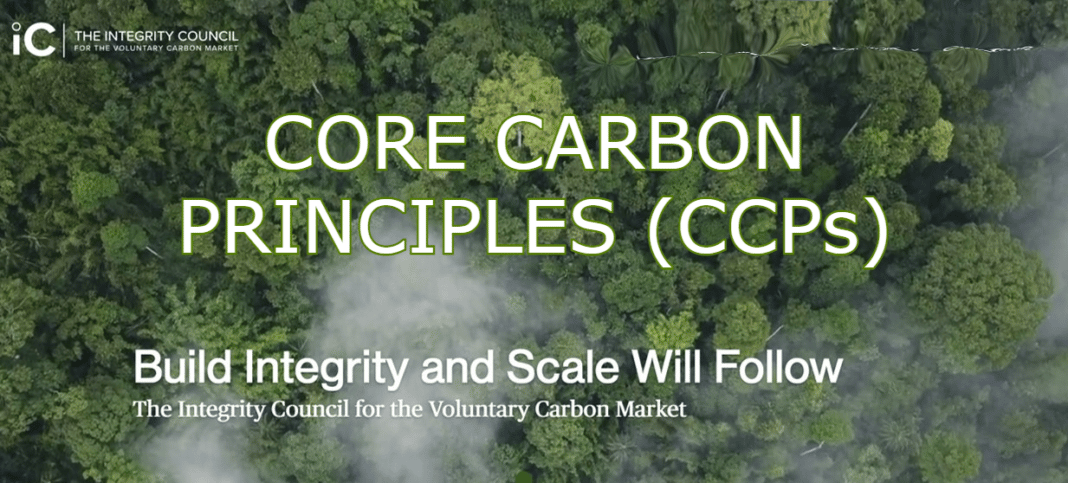The Integrity Council for the Voluntary Carbon Market set out the draft of its Core Carbon Principles for consultation to govern real, verifiable, and high-integrity carbon credits.
The ICVCM is an independent governance body that was recently-formed from the Taskforce on Scaling Voluntary Carbon Markets (TSVCM).
TSVCM is one of the leading organizations governing the carbon markets. It seeks to establish a global benchmark for carbon credits as efforts at beefing-up standards in carbon offsetting grow.
And one big part of its efforts is what the ICVCM seeks to establish – the Core Carbon Principles (CCPs) for high-quality carbon credits. The Council released its draft for public consultation.
Integrity Council’s Core Carbon Principles for Carbon Credits
The Core Carbon Principles (CCPs) will set new threshold standards for high-quality carbon credits. They will also provide guidance on how to apply the CCPs and define which carbon-crediting programs and methods are CCP-eligible.
The Council’s CCPs are a set of criteria ensuring that carbon credits bought to offset emissions have a real, verifiable climate impact. And that’s based on solid science, not speculations.
For carbon credits to be of high integrity, the ICVCM suggests that all carbon purchases (reductions or removals) meet CCP’s 10 key criteria:
- Additionality
- Mitigation activity information
- No double counting
- Permanence
- Program governance
- Registry
- Robust independent 3rd party validation & verification
- Robust quantification of emissions reductions & removals
- Sustainable development impact and safeguards
- Transition towards net-zero emissions
Moreover, mitigation efforts must avoid locking in levels of emissions or practices that are not in line with achieving the net zero emissions by 2050.
As per Carney, the UN Special Envoy on Climate Action and Finance:
“By providing a global threshold standard for credible, transparent, high-integrity carbon credits the Integrity Council’s new Core Carbon Principles will support the net zero transitions of companies… and the reduction of global emissions while providing much-needed financing to projects in emerging and developing economies and to Indigenous Peoples.”
Emissions reduction efforts must also be guided by: “clear guidance, tools and compliance procedures”.
Plus, all carbon credit programs must also be validated and verified by third-party. They also have to be robustly quantified according to: “conservative approaches, completeness and sound scientific methods.”
The Core Carbon Principles draft also suggested that all carbon crediting programs should be available with comprehensive and transparent information. Such information should be accessible to non-specialized audiences and come in electronic format.
They must also have effective governance systems to achieve:
- transparency,
- accountability, and
- overall quality of carbon credits.
Lastly, they should identify, record and track mitigation activities on a registry.
All these CCP criteria will ensure projects are compatible with sustainable development goals.
Public Consultation for the CCPs
VCM experts hope that growing the carbon markets will hit two birds with one stone in driving a sustainable future:
- By providing additional emissions mitigation to speed up the pathway to 1.5C
- By channeling resources to where investments are critical for climate adaptation and resilience.
Integrity Council Chair Annette Nazareth noted that the VCM exists to hasten a just transition to 1.5C. She also said that:
“In designing an effective market that can deliver genuine climate impact at speed and scale, we need to start with integrity. It is a precondition for a transparent, deep, liquid, standardized and scalable market that efficiently channels capital to where it is most urgently needed… To make this work, we need everyone from across the VCM to come to the table, share knowledge and expertise, and collaborate to co-create the CCPs…”
Indeed, dealing with the integrity of carbon credits fast is crucial as the debates around ESG and greenwashing continue to swirl.
The public consultation for CCPs will be open to all. It has to attract interest from key stakeholder groups operating in the VCM. These include finance, business, NGOs, scientists, governments, and members of the public.
The British Standards Institute (BSI) will oversee the consultation.
The consultation will seek views on several questions on the scope of the Council’s proposed core carbon principles. These include two crucial questions:
- Should the VCM levy a share of proceeds to development countries most vulnerable to climate change to meet the costs of adaptation?
- Should host countries have to authorize voluntary carbon credits bought in their jurisdiction?
Through the consultation, the ICVCM said the CCPs will pave the way for developing the spot and futures markets for carbon credits.
The Integrity Council further states that via CCPs, carbon markets will be liquid, scalable, and create transparent price signals. All these result in better price risk management.
The 60-day consultation will be until 27 September 2022, expecting submissions from all corners of the market. Click here to access the draft report

